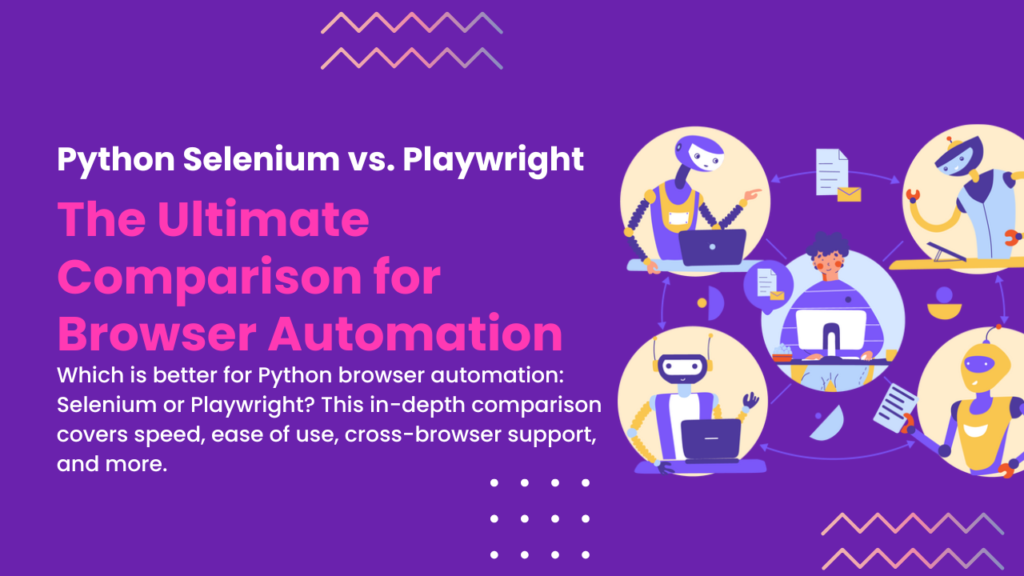Introduction
Is Selenium still the king of browser automation, or has Playwright taken over? If you’re automating web interactions, choosing the right tool can make or break your workflow. Selenium has been the industry standard for years, but Playwright, developed by Microsoft, has gained significant traction with its modern architecture and performance optimizations.
In this detailed comparison, we’ll break down the strengths, weaknesses, and ideal use cases of both Selenium and Playwright. By the end, you’ll know exactly which tool to choose for your automation needs.
Installation & Setup
Selenium
- Installation:
pip install selenium - Requires browser drivers (e.g., ChromeDriver, GeckoDriver)
- Works with most major browsers
Playwright
- Installation:
pip install playwright - Includes built-in browser drivers (
playwright install) - More straightforward setup with auto-handled dependencies
Winner: Playwright (simpler installation and driver management)
Architecture & Design Differences
Selenium
- Uses WebDriver protocol to communicate with browsers
- Relies on external drivers for browser interaction
- Supports both headless and non-headless modes
Playwright
- Uses WebSocket communication for real-time interactions
- Bundled browser binaries for consistency
- Headless mode by default, with seamless switching
Winner: Playwright (modern architecture, no external drivers required)
Performance & Speed
| Feature | Selenium | Playwright |
|---|---|---|
| Execution Speed | Slower | Faster |
| Resource Usage | Higher | Lower |
| Parallel Testing | Limited | Optimized |
Playwright’s WebSocket-based communication and auto-waiting mechanisms make it significantly faster than Selenium.
Winner: Playwright
Cross-Browser & Cross-Platform Support
| Feature | Selenium | Playwright |
|---|---|---|
| Chrome | ✅ Yes | ✅ Yes |
| Firefox | ✅ Yes | ✅ Yes |
| Edge | ✅ Yes | ✅ Yes |
| Safari | ✅ Yes | ✅ Yes (WebKit) |
| Mobile Support | ✅ Yes (Appium) | ✅ Yes (Built-in) |
Playwright supports mobile automation natively, while Selenium requires Appium.
Winner: Playwright
Ease of Use & API Features
Selenium
- Requires explicit waits (
WebDriverWait) - API can be verbose
- No built-in network interception
Playwright
- Built-in auto-waiting
- Modern and concise API
- Supports network interception and tracing
Winner: Playwright (more intuitive API and built-in utilities)
Handling Dynamic Content (AJAX, SPAs)
| Feature | Selenium | Playwright |
|---|---|---|
| Auto-Waiting | ❌ No | ✅ Yes |
| Handling Pop-Ups | ✅ Yes | ✅ Yes |
| Network Requests | ❌ No | ✅ Yes |
Playwright’s auto-waiting and network interception give it a significant edge.
Winner: Playwright
Debugging & Error Handling
- Selenium: Uses logging and external debugging tools.
- Playwright: Provides built-in tracing, test recording, and detailed logs.
Winner: Playwright
Integration with Testing Frameworks
| Framework | Selenium | Playwright |
|---|---|---|
| PyTest | ✅ Yes | ✅ Yes |
| Unittest | ✅ Yes | ✅ Yes |
| Robot Framework | ✅ Yes | ❌ No |
| Playwright Test Runner | ❌ No | ✅ Yes |
Selenium has broader support, but Playwright’s test runner is well-optimized.
Winner: Tie (depends on framework preference)
Community Support & Documentation
| Feature | Selenium | Playwright |
|---|---|---|
| GitHub Activity | High | Growing |
| Stack Overflow | More Q&A | Fewer Q&A |
| Documentation | Extensive | Well-structured |
Selenium has a larger community, but Playwright’s documentation is clearer and more modern.
Winner: Selenium (larger support network)
Use Cases & Best Scenarios
When to Use Selenium
✅ Best for testing legacy web applications ✅ Strong ecosystem with third-party integrations ✅ Supports Robot Framework and enterprise-level workflows
When to Use Playwright
✅ Best for modern web applications and SPAs ✅ Faster execution with auto-waiting and network interception ✅ Optimized for parallel execution
Conclusion & Final Recommendation
For legacy web apps and enterprise testing, Selenium remains a solid choice due to its established ecosystem and broader support.
For modern web apps, fast execution, and intuitive API, Playwright is the superior tool, offering better performance, built-in features, and easy debugging.
